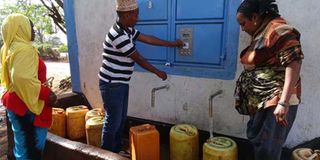Relief for Marsabit residents as cheap water comes through

A man fetches water at a dispenser machine in Marsabit Town. The water ATM technology has come as a relief to residents. PHOTO | IRENE MWENDWA | NATION MEDIA GROUP
What you need to know:
- Water in the region retails between Sh40 and Sh50 for a 20 litre jerry.
- The commodity is scarce and few people can afford to buy it from water truckers.
- The water is tapped from a spring in Marsabit forest, treated and then retailed to the locals.
A new technology for dispensing water through an automated teller machine (ATM) has made it easier for Marsabit Town residents to access the rare commodity.
The water ATMs are spread out in various locations to cater for a larger community.
The water ATM project is aimed at strengthening community resilience and is funded by the USAID through Food for the Hungry (FH).
It was implemented by the Pastoralists Community Initiative Development and Assistance (Pacida).
Kenya Resilient Arid-lands Partnership for Integrated Development (K-Rapid), through FH constructed a water kiosk and the new pipeline from the source spring in the forest.
Every household is provided with a registered card.

A family goes to fetch water from a dispenser in Marsabit. PHOTO | IRENE MWENDWA | NATION MEDIA GROUP
ATM CARD
The card is then loaded with the amount they provide through a Safaricom prepaid line that is installed in the dispenser.
“We have more than 2,000 households that are catered for by this dispenser in the town. Every household is allowed to fetch a maximum of 200 litres,” said Mr Diba.
Water in the region retails between Sh40 and Sh50 for a 20 litre jerry can because the commodity is scarce and few people can afford to buy it from water truckers.
As such, those who have invested in retailing water take advantage of desperate residents.
Nevertheless, under the ATM water dispenser project, the locals access the same amount for only five shillings.
Mr Diba said that the project had been running through an old manual kiosk where people fought for water and there was poor management.

The registered card given to each household is loaded through a Safaricom prepaid line that is installed in the dispenser. PHOTO | IRENE MWENDWA | NATION MEDIA GROUP
BETTER MANAGEMENT
“We were seeking a dispenser that will help us get organised and with clear management. In the old system money would be mismanaged and there was no fairness since water is scarce in the region,” said Mr Diba.
Every dispenser point has a register which is signed for by heads of households stating the number of people in the family though the number does not determine the amount of water a household gets.
However, head of 16 manyattas and a beneficiary of the project Guyato Jirmo, said the 200 litres provided for more than two weeks is not enough, hence they are forced to buy water from other local retailers.

Marsabit Town residents gather at a water dispensing point. Every household is allowed to fetch a maximum of 200 litres every time. PHOTO | IRENE MWENDWA | NATION MEDIA GROUP
NOT ENOUGH
Ms Jirmo said that a family cannot survive on the small amount since they fetch after every fortnight.
“We rotate per manyattas and each group fetches after every 16 days. We use the water for drinking, cooking and cleaning which means 200 litres cannot [take us] through 16 days,” said Ms Jirmo.
She also noted that in the past, people would spend days and nights queuing for water and some would even go home with empty jerry cans.
“This new technology has also improved the speed at which we get access to water and it has brought fairness,” said Ms Jirmo.
The water is tapped from a spring in Marsabit forest, treated and then retailed to the locals.
To access the dispensers, one is supposed to belong to a specific village and register with the elders.
“If one is not known by the manyatta elders, they are not registered and they cannot access the dispenser cards,” said Ms Jirmo.




